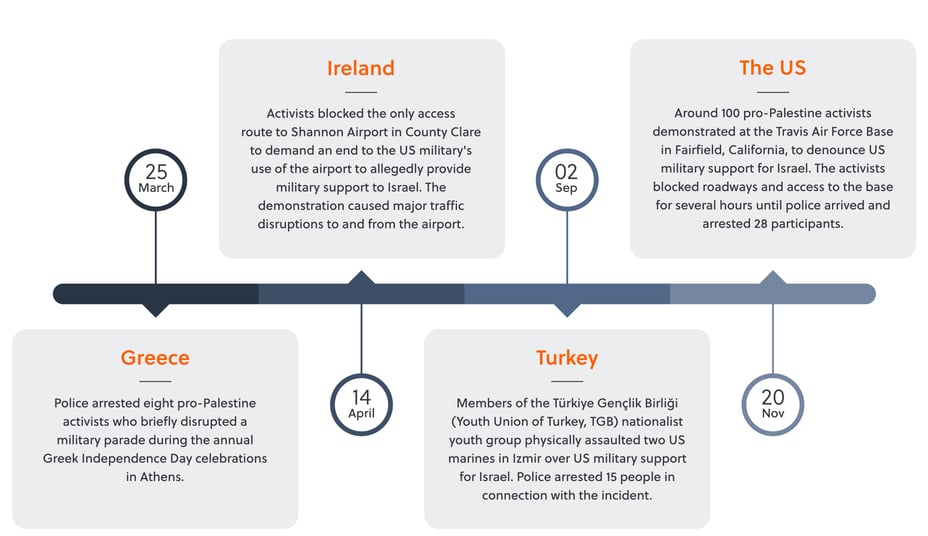Over the course of 2024, activists have mobilised around the world over a range of pertinent issues. With the underlying drivers behind these protests largely unaddressed, demonstrations will continue and potentially evolve this year, writes Shannon Lorimer.
The year 2024 has been marked by a global surge in civil unrest. A wide range of issues, including controversial government policies, armed conflict and immigration dynamics, have driven widespread, frequent and disruptive protests. While these demonstrations have seen varying degrees of success in challenging the status quo, the underlying drivers of protest action mostly remain in place and are likely to instigate further unrest in 2025.
Anti-war protests
Hundreds of protests have occurred globally over the Israel-Palestine conflict, mainly relating to demands for a ceasefire in Gaza, the release of Israeli hostages held by Hamas, and for Western governments to end military support for Israel. While these demonstrations typically conclude peacefully, barring some incidents of clashes between protesters and security forces, there have been several unruly incidents. For example, in November, pro-Palestine activists blockaded the Ambarli Port in Istanbul to prevent the use of Turkey’s ports for shipments to Israel. Activists have also blockaded entrances of weapons manufacturers and military bases around the world, including in the UK. In Israel, activists have denounced Prime Minister Benjamin Netanyahu’s perceived failure to secure the release of hostages held by Hamas, leading to demonstrations attended by hundreds of thousands of participants in Tel Aviv.
Unrest over US military aid to Israel, 2024 
Public frustration among both pro-Palestine and pro-Israel activists will also sustain wider unrest in the absence of a ceasefire in Gaza. While protesters in several countries continue to signal disdain for their governments’ military support and diplomatic backing for Israel, the US in particular has faced significant divisions in public opinion. President-elect Donald Trump‘s handling of the situation – particularly if he allows Netanyahu a freer hand in managing the conflict, or pressures university campuses to clamp down on student activism – could see unrest spike amid already heightened political tensions and polarisation.
Unpopular government policies
There were numerous protests against controversial government policies in 2024. In June, protests over the Finance Bill in Kenya, which proposed increased taxes on goods like fuel, saw widespread looting and property damage. While the government adjusted the bill, dissatisfaction with the high cost of living persists and could lead to a spike in protests should authorities attempt to reintroduce similar legislation. In Nigeria, the introduction of economic reforms, like the removal of fuel subsidies in August, drove widespread protests, prompting the extended closure of numerous small and medium-sized businesses. Argentina, meanwhile, also saw sustained strikes and protests, denouncing President Javier Milei’s controversial economic reforms.
These protests reveal the fine line governments must walk in introducing reforms deemed necessary to enhance economic growth in the long-term, and meet the immediate needs of their citizens. Failure to deliver on promises of socio-economic upliftment will foster greater calls for protest and strike action, especially in countries battling high inflation. In Bolivia, for example, the government’s failure to address fuel and foreign currency shortages will likely continue to be leveraged by opposition figures to drive protests ahead of the general election in August 2025. In Mexico, President Claudia Sheinbaum’s uphill battle in addressing organised crime and associated violence could see a resumption in protests by various sectors affected by insecurity, including logistics operators, who staged disruptive strikes and road blockades in 2024. In Sri Lanka, despite an International Monetary Fund bailout, the risk of further debt issues remains high, potentially sparking civil unrest if President Anura Kumara Dissanayake’s leftist coalition fails to drive financial recovery.

Protesters kneel during an ‘End Bad Governance’ demonstration in Nigeria in July 2024
In numbers: The human and economic costs of anti-government protests in 2024
Kenya: At least 39 people killed in protests against the Finance Bill in June.
Nigeria: 14 days of #EndBadGovernance protests resulted in an estimated USD 520 million in losses to the economy in August.
Bolivia: 17 days of opposition protests caused an estimated USD 1.7 billion in economic losses in October.
Argentina: In a protest denouncing budget cuts in the education sector in April, hundreds of thousands of activists protested countrywide, with an estimated 500,000 people participating in Buenos Aires alone.
Immigration dynamics
Anti-immigration sentiment drove multiple violent protests in 2024. In the UK, misinformation on the identity of an assailant in a stabbing attack in Southport prompted anti-immigration riots in July, resulting in vandalism of shops, businesses, vehicles and private homes. The spread of misinformation has seen similar demonstrations in Turkey, where reports that a Syrian refugee had allegedly sexually harassed a young Turkish girl prompted violent riots in the Melikgazi region of central Kayseri Province. Residents overturned cars and set shops alight, demanding Syrians leave the country.
In 2025, anti-immigrant sentiment will continue to influence political and social landscapes in various countries. And some less favourable narratives around immigrants, refugees and asylum seekers – especially their perceived impact on local security dynamics, cultural norms, and government resources – will keep feeding into rising populism in many countries. France, in particular, has witnessed significant protests from both the far-right and far-left factions, with immigration as a focal issue. For instance, in January 2024, approximately 75,000 people protested countrywide to denounce a controversial immigration law considered by critics to threaten migrant rights. In Germany, home to nearly a million Syrian refugees, the recent fall of the Bashar Al Assad regime could intensify pressures from far-right groups advocating for the refugees’ return to Syria. In the US, immigration will continue to be a significant issue in the coming year. While anti-immigrant protests may see a decline due to the election of Trump, known for his support of stringent immigration policies, demonstrations against controversial measures such as mass deportations may intensify in 2025.


